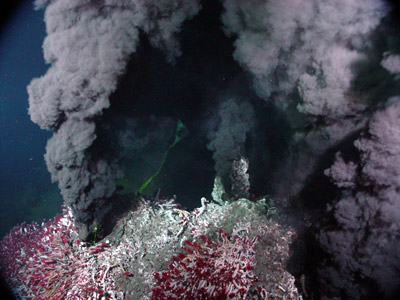I’m going to admit that I’ve been procrastinating on fulfilling this reader request for a while now. As any of you who are writers can attest, the hardest things to write about are those that you know a lot about and those that you know very little about. The sweet spot is somewhere in between, where you don’t have to worry about overwhelming your audience with details and yet you know enough to make things interesting. Unfortunately, this topic is both something I know too much about and something I know too little about. Strange, I know, but it’s true. Still, James Colbert requested this topic; it’s certainly right up this blog’s alley; and, well, I aim to please. So here we go.
Misconception: Evolution is a theory about the origins of life.
Correction: Although certainly contiguous with evolution, research into life’s origins is not usually considered evolutionary research.
 I can’t claim to be an expert on origins-of-life research (hence the I-know-too-little) but I have edited a biochemistry unit in a college text authored by an expert (hence the I-know-too-much). It’s an active and quite contentious field, one full of open questions and competing hypotheses. Did life emerge as a simple system in a complex environment or as a complex system in a simple environment? Was replication first or was metabolism first? Were cells latecomers or early arrivals? Did it happen in a “warm little pond” or at a hydrothermal vent or on a different planet altogether? To a scientist or science enthusiast, these types of questions are exactly what make origins-of-life research so fascinating.
I can’t claim to be an expert on origins-of-life research (hence the I-know-too-little) but I have edited a biochemistry unit in a college text authored by an expert (hence the I-know-too-much). It’s an active and quite contentious field, one full of open questions and competing hypotheses. Did life emerge as a simple system in a complex environment or as a complex system in a simple environment? Was replication first or was metabolism first? Were cells latecomers or early arrivals? Did it happen in a “warm little pond” or at a hydrothermal vent or on a different planet altogether? To a scientist or science enthusiast, these types of questions are exactly what make origins-of-life research so fascinating.
To someone looking to burst the balloon of evolution, however, the unsettled state of research on the origins of life looks a lot like a long, sharp needle. Once you conflate the two areas of research, gaps in our current understanding of origins of life become gaping voids in evolutionary theory that only a supernatural force can fill. Active debates in origins of life become, somehow, evidence that evolutionary biologists haven’t a clue about anything whatsoever. And likewise, open questions of origins of life are proof positive that evolution never can and never will be positive about anything.
But to reach such conclusions it’s necessary to miss several important points. First and foremost, evolution is not a theory about the origin of life. Evolutionary theory attempts to understand and explain how the tree of life has branched out and spread over the last 3.5 billion years or so. To make progress in understanding and explaining the twigs and the branches and the trunk, it’s usually not necessary to address the planting of the primordial acorn, so to speak. So most evolutionary biologists aren’t working on the origins of life at all.
Who is? Well, it’s a multidisciplinary area of research, involving not only evolutionary biologists but also chemists—especially biochemists and geochemists. For that reason, the area is often, somewhat confusingly, called chemical evolution. Call it what you will, the primary goal of origins-of-life research is not to understand the patterns and the mechanisms of evolution, but rather to understand how non-living chemicals could have come to form a self-replicating, self-contained system–life. This event (the first life) is therefore a bit like a baton handoff from chemical evolution to biological evolution—except, perhaps, that it might be intrinsically vague exactly when the transition occurs.
Next week, I’ll talk about some of the most popular (unpopular?) aspects of origins of life research among those that find it objectionable. In the meantime, what are your questions about it? If you’re a teacher, how do you handle the topic if it comes up? And above all, does anyone else giggle when they say “phosphodiester linkage”? Or is it just me?
Until next time…
Are you a teacher and want to tell us about an amazing free resource? Do you have an idea for a future Misconception Monday or other post? See some good or bad examples of science communication lately? Drop me an email or shoot me a tweet <at>keeps3.

